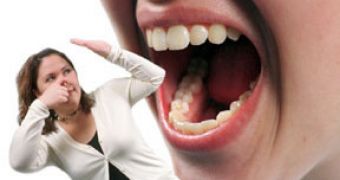Sooner or later, this problem affects about 80 % of the population, putting people in embarrassing situations, and creating frustration and sufferance. Medically, it is called halitosis, but people just call it offensive-smelling breath or bad breath.
It is easy to detect the bad breath of the others, but most likely impossible the feel yours. Our smell sensors get so used to our own breath that even the persons with the most offensive breath may not be conscious of this. That's why most find this from the others, an extremely embarrassing situation.
Even if so widespread, the bad breath is considered repugnant and unacceptable. It can even cause severe affective traumas, leading to social isolation, divorce and even suicidal thoughts.
For long, physicians associated the bad breath with disease. Today there are even apparatuses measuring the level of bad smells in your mouth. Over 400 volatile chemicals have been found by now in the human breath, most inodorous, and the main culprits for the bad breath are hydrogen sulfide and methyl mercaptan, the same chemical that give the skunk's its famous foulness.
There are over 300 species of bacteria living inside the human mouth. Because the mouth is dim, warm and wet, it makes the ideal environment for bad breath inducing bacteria. But the bad breath have been linked mainly to four bacteria species: Veilonella alcalescens, Fusobacterium nucleatum, Bacteroides melaninogenicus and Klebsiella pneumoniae. They eat food remains, dead cells and other chemicals found in the mouth, producing through feeding the offensive-smelling gases. It is similar to garbage decomposition. In most cases, the bad breath is the result of putrefaction that can lead to the destroy of the teeth and gum disease.
The putrefaction process is accelerated during the sleep. During the day, your mouth is continuously rinsed by saliva, which is slightly acid and removes the bacteria. But the saliva produced in a hour of sleep is 50 times less than that produced during the active period. The morning mouth is like a frowzy pool containing 1,600 billion bacteria, causing the "morning breath" accompanied by the unpleasant taste.
Stress to can cause the drought of the mouth. An emotional speaker can have at the end of his/her speech the mouth dry, accompanied by the bad breath.
But bad breath is not always the result of the bacteria. Alcohol consume, belching, menstruation, ovulation, lack of mouth hygiene, medication, smoking and tooth surgery wounds can induce bad breath. And in some cases, persistent bad breath can be a symptom of a disease, like bronchitis, chronic gastritis, diabetes,, dry mouth, gum disease, hiatal hernia, renal insufficiency, liver conditions, mouth inflammation, sinusitis, certain cancers, tooth decay and tuberculosis.
The bad breath can come also from the stomach, but this happens in rare cases. More often, offensive smells can be generated in the lungs. For example, if we eat onion or garlic, their chemicals enter into the bloodstream, which transports them to the lungs. The volatile gases are exhaled through the nose and mouth. Researches showed that the breath can smell like garlic even we have just rubbed garlic on the foot's sole or swallowed it without chewing.
Alcohol consume makes your blood and lungs smell like alcohol. Some food smells can persist in the organism for 72 hours.
The bad breath cannot be treated just with refreshing candies. An important way to fight it is a good mouth hygiene, which will keep low the bacteria populations. This is done by eliminating regularly the food remains and the teeth calculi, by brushing your teeth after each meal and before sleeping. Use at least once a day the dental thread. Brush also gently the tongue, a preferred hide place by the bacteria. The teeth calculi must be periodically eliminated.
Temporary measures are water drinking, and the chewing of sugar free gums, that stimulate the saliva production. Watch out: mouth waters containing alcohol can in fact dry your mouth! And then mouth waters leave behind 70 % of the bacteria, explaining why the bad breath can return in 10 minutes after using it. In just a few hours, the bacteria have returned to the initial number.

 14 DAY TRIAL //
14 DAY TRIAL //